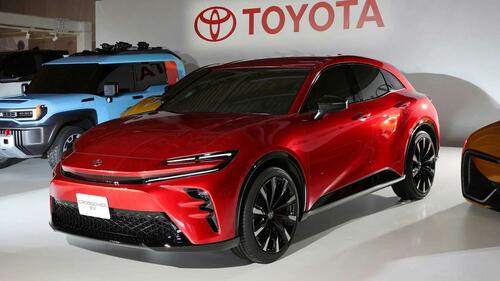SOURCE"
Here's Why Toyota Isn't Going All-In On Electric Vehicles | ZeroHedge
While many automakers have committed billions of dollars in recent years to develop all-electric vehicles, Toyota has approached the technology with far more caution - opting instead to continue investing in a portfolio of hybrid "electrified" vehicles, such as the Prius.
And while the Japanese automaker was a darling of US environmentalists and 'eco-conscious' consumers when the Prius came out two decades ago, given that it was among the cleanest and most fuel-efficient vehicles ever produced - Toyota has fallen out of favor with the 'green' crowd thanks to its hesitancy to jump into the fray with fully electric vehicles.
"The fact is: a hybrid today is not green technology. The Prius hybrid runs on a pollution-emitting combustion engine found in any gas-powered car," said Katherine García, director of the Sierra Club’s Clean Transportation for All campaign, in a recent blog post.
As CNBC notes, Greenpeace has now ranked Toyota at the bottom of a list of 10 automakers' efforts to 'decarbonize,' citing slow progress in its supply chain and sales of zero-emission vehicles, which are less than 1% of Toyota's sales.
While automakers such as General Motors, Volkswagen and others vowed to invest billions of dollars in recent years to develop all-electric vehicles that don’t require gas-powered engines like the Prius, Toyota lagged, only more recently announcing similar investments. It also continues to invest in a portfolio of “electrified” vehicles – ranging from traditional hybrids like the Prius to its recently launched, yet underwhelming, bZ4X electric crossover. -CNBC
Toyota execs say the strategy is appropriate given the lack of EV-supporting infrastructure around the world, as well as the high cost of the vehicles.
"For as much as people want to talk about EVs, the marketplace isn’t mature enough and ready enough ... at the level we would need to have mass movement," said Jack Hollis, executive vice president of sales at Toyota Motor North America, during an August virtual meeting.

That said, Toyota announced in December a $28 billion investment (4 trillion yen) in a lineup of 30 battery-powered electric vehicles by 2030, and will continue to invest in hybrids such as the Prius and other potential models.
"We want to provide each person with a way that they can contribute the most to solving climate change. And we know that that answer is not to treat everybody the same way," said Gill Pratt, Toyota chief scientist and CEO of the Toyota Research Institute, during a media event last month in Michigan.
Meanwhile, the company announced several weeks ago that it would allocate $5.6 billion for hybrid and all-electric battery production in Japan and the US as part of the aforementioned 2030 plan.
And while this may seem like a significant amount of money, which it is, it's dwarfed by commitments from competitors such as GM and VW - the former of which has announced it will exclusively offer "zero-emission" EVs by 2035. Other automakers have vowed to set targets for at least 50% of their vehicles sold in North America to be all electric.
Toyota, meanwhile, has a goal to sell 3.5 million electric vehicles per year by 2030 - over 1/3 of current sales, which include around 1 million units from its Lexus brand, which will exclusively offer EVs in Europe, North America and Chiny by then.
"I think they’re hedging their bets," said Paul Waatti, manager of industry analysis at AutoPacific. "From a global perspective, a lot of markets are moving at different paces. U.S. is slower than Europe and China in EV adoption but there are other markets where there’s no infrastructure at all. To take a varied approach in powertrains makes sense for a global automaker."
According to Toyota, electric vehicles are one solution, not the solution, for the company's carbon-neutral goals.
"In the distant future, I’m not investing assuming that battery electrics are 100% of the market. I just don’t see it," said Jim Adler, founding managing director Toyota Ventures. "It really will be a mixed market."